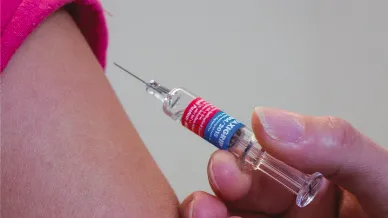
Vaccination in Asia slows as it faces supply constraints
In Asia, only 24.43% of the population have been fully vaccinated.
At the onset of the pandemic, the public was constantly reminded to follow safety protocols to protect themselves from being infected by COVID-19. Now, vaccines have been developed and are being rolled out. Whilst no vaccine is 100% protective, the World Health Organization (WHO) said approved vaccines provide a “high degree of protection” against getting seriously ill and dying from the virus.
According to Our World in Data, 4.59 billion doses have been administered globally, with 31.2% of the world population having received at least one dose and 23.5% fully vaccinated, as of 14 August.
Unfortunately, in Asia, only 24.43% of the population have been fully vaccinated and 7.2% have been partly vaccinated, according to Our World in Data. This is low compared to the 43.68% fully vaccinated in Europe and 7.8% partially vaccinated, whilst 40% have been fully vaccinated in North America and 12% have been partly vaccinated.
“Vaccination in Asia is progressing relatively slow in terms of the population covered so far compared to the European Union and the US. Governments in various countries are trying their best to improve the vaccination rollout, but the supply constraints could limit their efforts,” Prashant Khadayate, practice head of Pharma at GlobalData, said.
Rollout challenges
Sakshi Sikka, senior pharmaceuticals and healthcare analyst at Fitch Solutions, also cited supply issues as one of the main drivers for the slow vaccination pace in Asia. This is also partly due to the “sheer size of most countries’ populations.”
“Many Asian markets continue to lag behind the global average vaccination rate and are now facing vaccine supply issues because India, the third-largest global manufacturer, has paused exports,” she said. “China and India are running the world’s largest vaccination drives. Despite an early start, China and India’s vaccination programme have made slower progress than in the US and the EU.”
Wealthier nations, such as Japan and South Korea, have also mounted slow vaccination campaigns mainly due to supply issues and manpower challenges, she said.
Khadayate also said that based on GlobalData’s COVID-19 dashboard, the EU is leading globally based on the total vaccine contract volume, followed by the US, showing that these regions have already secured the bulk of the vaccine supply.
There is a need to meet the “demand-supply gap” as many developed countries are still struggling to meet the demand in their countries.
According to Fitch Solution’s report published in May, only Singapore, Bhutan, and Mongolia were the countries that will achieve vaccination of priority population, or the frontline healthcare workers, people ages 65 years and above, and those with underlying conditions by the end of June.
Australia, Brunei, Cambodia, China, Hong Kong, India, Japan, Malaysia, New Zealand, South Korea, and Thailand are seen to vaccinate their priority population by the end of September 2021. Bangladesh, Indonesia, Laos, Pakistan, the Philippines, Sri Lanka, Taiwan, and Vietnam are expected to vaccinate their priority group by the end of February 2022.
Myanmar, meanwhile, which vaccination programme has been affected by the political situation in the country, will vaccinate its priority population by the end of 2022, according to the report.
Fitch also said that several markets in the Asia Pacific region rely heavily on vaccine supplies from the COVAX facility, which is co-led by WHO, Coalition for Epidemic Preparedness Innovations, and Gavi to ensure “fair and equitable” access for every country. It said that this may be affected by export restrictions from India where Serum Institute India, one of the suppliers of COVAX, is located.
WHO said previously that herd immunity or population immunity can be achieved if a “substantial proportion” of a population would be vaccinated, lowering the amount of virus spreading to the whole population. It said that this varies per disease, citing 95% requirement for measles and 80% for polio.
Moody’s Analytics report in July said only Singapore is approaching herd resilience with just above 50% of its population, approaching the situation in the US and Europe, where “at least in many of their large population centres, it is becoming possible to live with COVID-19 as an endemic disease.”
Moody’s said Cambodia, Hong Kong, and Japan are at above 25% and there is also accelerating vaccination around the APAC, notably in China, Japan, Cambodia, Malaysia and Indonesia.
Korea’s vaccination slowed, whilst India struggled to accelerate. Countries such as Indonesia, the Philippines, and Thailand are experiencing challenges in acquiring sufficient supply but were expected to achieve herd resilience by 2023. “Much of the rest of the region will reach this point sometime next year,” it said.
According to Singapore’s Ministry of Health, 75% of the population has completed a full regimen of COVID-19 vaccines and 81% received at least one dose as of 13 August.
The WHO also said that whilst some virus variants have a slight impact on the ability of vaccines, the vaccines “are likely staying effective” against them because of the broad immune response they cause. It said that it continues to review the evidence and update its guidance on vaccines.
Health institutions and hospitals have been on the frontline in attending to COVID-19 cases from testing, isolation and treatment. But they are also engaged in their respective national vaccination programmes, from administering the vaccines to leading in educating the public on vaccination.
Fullerton Health, which is present in nine markets across the Asia Pacific and owns over 500 facilities, cited “managing expectations on the ground on vaccine ability” as one challenge, Group CEO Ho Kuen Loon said.
Ho said there are also challenges in cold chain logistics to store the vaccines, as some locations they were sent do not have air-conditioning, and crowd management as mass vaccination centres that cater up to 4,000 people a day were also amongst the challenges in the vaccine rollout.
“All these challenges are solved through a partnership with other industry leaders, pharmaceutical, refrigeration, events management company, grassroots organisation, and, most importantly, government agencies,” he said.
Mohamed Sahriff, assistant director of Medical and Business Development at Global Doctors Group in Malaysia, said that there is a challenge arising from the non-tech-savvy population in using the digital application for contact tracing, COVID-19-related information and vaccination and in reaching out to those in rural areas, he said.
There are also individuals who are reluctant in getting the vaccines that Global Doctors Hospital sees can be addressed by awareness and proper information.
Jefferies said experts they have spoken to said the SARS-COV-2 virus “will likely be with us for some time,” it said In a July report, and its end is not when the virus vanishes, “but a better definition might be when mortalities from COVID-19 start to resemble influenza in a typical year.”
“When that happens, we will have moved back to what some might call ‘normal’, albeit with the public health measures still in place,” it said, adding that monitoring, potential revaccination and isolation of cases are still needed to control risk even when herd immunity is achieved.
It also noted that the rapid spread of more contagious variants is a “stark reminder” to places employing “eliminate or zero COVID strategy” that border and movement restrictions may not be a substitute for mass vaccination programs.
It said that countries leading in terms of vaccination rates have seen outbreaks but significantly fewer deaths and hospitalisations.
Vaccine hesitancy
Vaccine hesitancy is not a problem with the majority of the people but it is still present among some due to lack of confidence in vaccine effectiveness, Khadayate said. He said that this can be by proper education and with both governments and hospitals focusing on COVID-19 vaccine awareness.
“Clear and consistent information is key” in improving the vaccination programme, Steve Cochrane, Chief APAC Economist at Moody’s Analytics said, adding that consistent implementation in all countries as well as hiring enough healthcare workers are also critical.
Lau Beng Long, managing director of Sunway Healthcare Group (SHG) in Malaysia, also noted that awareness and continued education about vaccines are more important. He said the group has initiated “Vaccine Matters,” which is a series of educational messages debunking myths about vaccines.
Sahriff said Global Doctors Hospital is conducting initiatives in promoting confidence in the effectiveness and safety of the vaccines. “Recognising that vaccination campaigns of the magnitude needed are unprecedented, actions by the private hospitals to garner trust will be essential to the success of the vaccination rollout process, and to the emergence of more resilient societies after the crisis.”
Khadayate also said that hospitals are also publishing studies with statistics on the benefits of
the vaccines to the healthcare workers which help in increasing trust in the vaccines. They may also provide incentives for those vaccinated, it might not be the “key driver” as it is important to educate the public on its benefits.
“Their COVID-19 vaccination- related confusion is further boosted as vaccinated people are still getting positive and become critical and die in some instances even after complete vaccination. Hence, it is crucial to run educational initiatives which inform the public about vaccine-related anxiety and instill confidence for COVID-19 vaccination,” he said.
The role of hospitals, health institutions
Khadayate said hospitals are “actively involved” in the vaccination rollout, with many big hospitals procuring vaccines from pharma companies and partnering with corporates to run vaccination at offices and holding mass vaccinations.
Lau of Sunway Healthcare also said the partnerships with private sectors such as private hospitals and general practitioners (GP) clinics, and non-government organisations aided in speeding up vaccination rollout. He noted that Malaysia has one of the fastest vaccination rates, giving out more than 500,000 doses daily.
“Private sector has an important role to support the country’s vaccination programme by providing clinical management, e.g. doctors, nurses and pharmacists for vaccine administration, counselling and observation post-injection,” he said. Lau said SHG was the first in the state of Selangor to train healthcare workers in administering the COVID-19 vaccines and inoculate healthcare workers in the district during the Phase 1 implementation of the vaccination program in Malaysia. It converted the convention centre in its flagship hospital Sunway Medical Centre as a vaccination hub at the end of February.
The medical centre was then appointed to vaccinated senior citizens and Sunway Medical Centre was appointed as the healthcare organiser in managing the Sunway Pyramid Convention Centre, vaccinating up to 5,500 doses daily.
Two more of its subsidiaries, Sunway Medical Centre Velocity and Sunway Specialist Centre Damansara were appointed as vaccination centres. As of 8 August the four vaccination centres have administered over 326,000 doses.
Lau also emphasised that accessibility is important in reaching the public for the vaccination programme, noting that public and private partnership in the rollout can help in achieving herd immunity faster.
“Resources from private hospitals and GP clinics can help the country to increase its number of public vaccination centres,” he said. “Mobile teams can be set up in order to reach out to more rural communities.”
Fullerton Health supports the respective government’s plans for the inoculation programme, Group CEO Ho said.
“We work very closely with government agencies to enable last mile service delivery to the people. Whether it is managing people coming to our clinics for vaccination, or setting up and running mass vaccination centres or mobile vaccination teams that goes deeper into the heartlands to reach as many people as possible,” he said.
In Singapore, Fullerton Health runs 10 major vaccination centres and 3 mobile teams delivering 1.6 million shots, whilst in the Philippines, it runs a drive-through vaccination site and five other sites for local government.
It also has 46 GP clinics giving COVID-19 vaccines across Australia as part of its national vaccination rollout and has given more than 45,000 jabs. In Indonesia, it has obtained a license to administer COVID-19 vaccines, pending government allocation of vaccines, but is expected to start by the fourth quarter, Ho said.
Sahriff of Global Doctors said the hospital is also a part of the National Immunisation Programme of Malaysia starting in May wherein the government allows private hospitals and medical centres to be a vaccination centre, where they currently administer 80 to 100 vaccines a day to the general public.
Their primary care facilities also take part in the vaccination rollout and for factory workers as part of the National Immunisation Programme- Industry. Global Doctors have vaccinated close to 4,000 individuals daily since June, he said.
“The ability for hospitals to be more engaged in the vaccination rollout process can alleviate some of the challenges we are currently facing and accelerate the vaccination process to achieve herd immunity,” he said.
Benefits for health institutions
Hospitals and health institutions are also set to benefit when vaccine coverage reaches the majority of the population as the likelihood of COVID-19 cases requiring hospitalisation would decrease.
“Once, risks of the COVID-19 are minimum; hospitals will see more inflow of patients for Outpatient consultations and elective surgeries. It will, in turn, drive the overall hospital revenues,” Khadayate said.
Sikka of Fitch Solutions said hospitals will be able to focus on surgeries and screening programmes that were postponed because of the pandemic.
During the pandemic, Fullerton Health observed that footfall at its retail clinics and inhouse corporate clinics have fallen but they saw a rise in demand for testing and vaccination services by companies and governments. They also adopted digital services such as Telemedicine.
“Our seamless integration of online and offline medical services will hold us in good stead. In addition, the pandemic has led many large corporations to seek consultancy services to cover health as a core corporate function. The ability to ensure normal operations and keep their employees safe is critical in a post-pandemic world,” he said.
Lau of SHG also said that herd immunity will reduce the number of infections and critically ill cases, allowing the health system to cope and will also help reduce the workload and pressure on healthcare resources and facilities.
The speedy rollout of the vaccine will hasten economic recovery in Malaysia, Sahriff said, adding that it will lead to people becoming more health-conscious and seeking treatment without the fear of contracting severe COVID-19 symptoms. Medical tourism resurgence is also expected in Malaysia across regions.
“Global Doctors Hospital also believes private healthcare facilities will have a big part to play in the travel bubble initiative to keep COVID-19 infections at bay, especially for domestic and international travellers,” he said.
Economic impact
The vaccine rollout is also important in the economic recovery in Asia, Cochrane said.
“The key to economic recovery is to minimise the need for lockdowns that constrict domestic demand, and in some cases production for export markets as well. High vaccination rates minimize the severity of COVID infections and mortality rates, and thus allow policymakers to be more lenient on movement controls,” he said.
Cochrane said that when it is shown that vaccination rate is lowering the transmission of the virus, the severity of the illness and mortality rate, “then lockdowns, which hobble the economy, can be eased and ultimately eliminated.”
According to a Moody’s report, the spread of the Delta variant, which is more transmissible, is disrupting the economic recovery in Southeast Asia as this prompted governments to impose lockdowns and travel restrictions.
The imposing of stricter social distancing measures in different countries, although not scheduled for a long period, slows domestic spending. “Our forecasts for the third quarter across much of APAC are revised lower, but some recovery is expected in the fourth quarter.”
Moody’s also said that lifting movement restrictions in Asia Pacific and reopening domestic economies rely on vaccinations.
“Despite the struggles to contain the current wave of COVID-19 that create considerable risk, under assumptions that the global economy continues to support export trade and the APAC domestic economies can ease out of current movement restrictions, acceleration in the fourth quarter will ensure positive economic growth for 2021,” it said, noting that Global GDP this year will be around 5 to 5.5%, above its 3% potential growth rate as it recovers from last year’s recession.
Moody’s said there were three risks to the outlook for 2022 and 2023: the first is the insufficient vaccine supply, or governments and public health systems incapable of managing logistics of large-scale vaccination programs.
Other risks were the timing of normalisation of fiscal and monetary policy, and the household and corporate debt “that has been under debt payment moratoriums since the pandemic emerged” as they may struggle to make payments and reduce expenditures on goods and spending when debt holidays end.
“But if the economy performs as expected and accelerates once again in the fourth quarter and into next year, these risks will be minimized,” it said.



















 Advertise
Advertise







